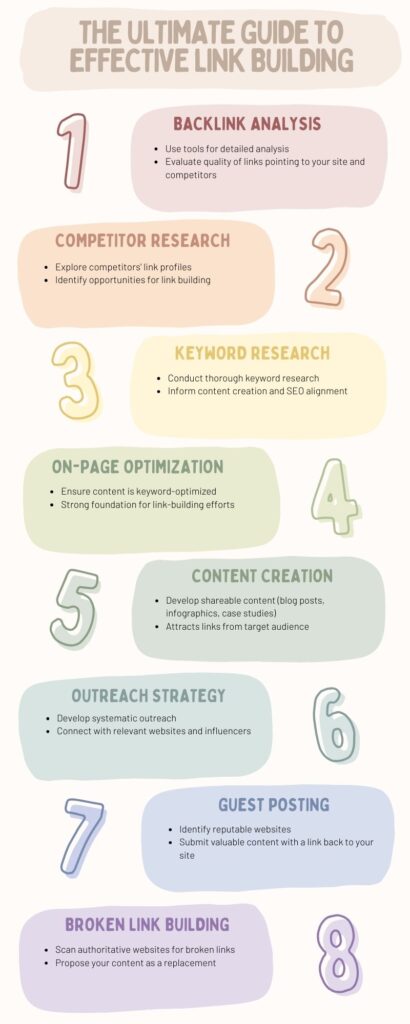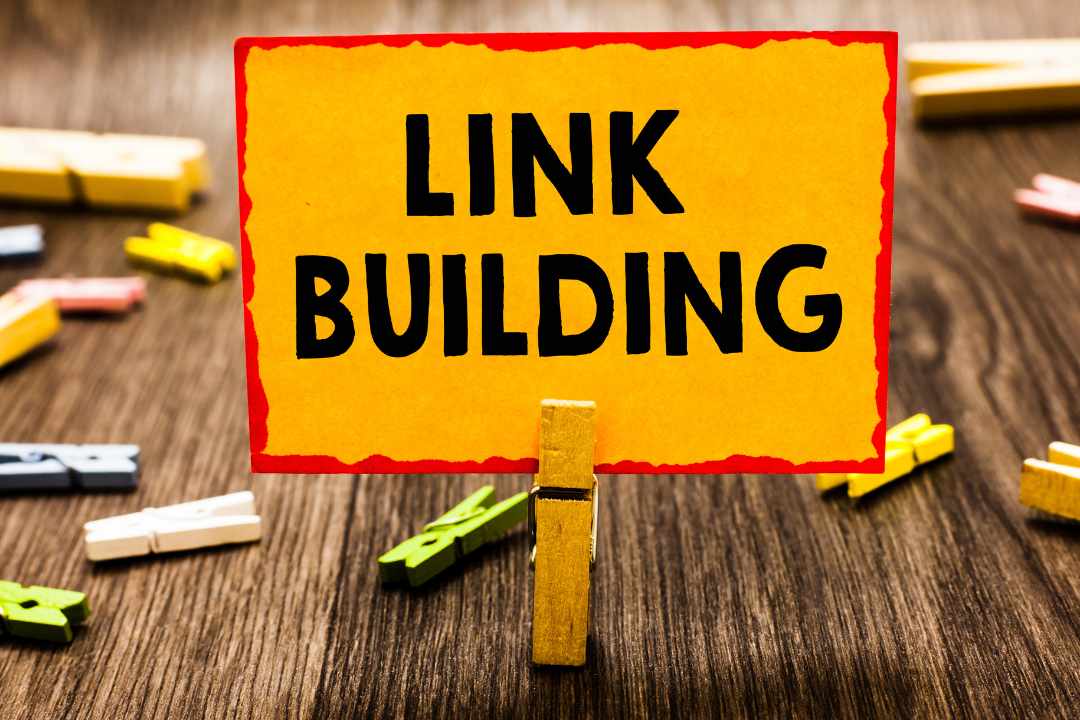Link building is a process in digital marketing and search engine optimization (SEO) where website owners or marketers acquire hyperlinks from other websites to their own. These hyperlinks, or simply “links,” play a crucial role in determining a website’s authority and credibility in the eyes of search engines.
The more high-quality and relevant links a website has, the more likely it is to rank higher in search engine results. Link building involves outreach, relationship-building, and creating valuable content that encourages other websites to link to yours. It helps improve a site’s visibility, traffic, and overall SEO performance.
Practical Applications of Link Building
Search Engine Rankings Boost: Link building is pivotal for lifting a website’s position in search engine rankings. Search engines interpret links as affirmations of credibility, and websites with a substantial number of high-quality backlinks are often regarded as authoritative, resulting in improved search rankings.
Increased Website Traffic: Quality links originating from reputable websites can directly boost website traffic. Users who encounter your link on other sites and perceive its significance are more likely to click through, contributing to an overall increase in website traffic.
Establishing Authority and Trustworthiness: Links from authoritative and reputable sites contribute to establishing your website’s credibility. When other entities link to your content, it signals to both users and search engines that your site is trustworthy and holds authority in your industry.
Brand Exposure and Recognition: Link building leads to increased brand exposure. When your website is linked from various reputable sources, it raises awareness about your brand, products, or services.
Referral Traffic Channels: Links can serve as pathways for referral traffic. Clicks on links from other websites essentially refer users to your site, potentially resulting in conversions, sales, or other desired actions.
Competitive Edge: In competitive industries, link building is essential for maintaining a competitive edge. Regularly acquiring high-quality backlinks ensures that your website remains visible and competitive in search engine rankings.
Localized SEO Benefits: For businesses with a physical presence, local link building is valuable for improving local SEO. Links from local directories and citations contribute to improved visibility in local search results.
Social Validation: Links from social media platforms, forums, and community websites act as social validation. They indicate that your content is valued and shared within the online community, contributing to building trust among your audience.
Adaptability to Algorithmic Changes: As search engine algorithms evolve, link building remains a foundational aspect of SEO. While specific strategies may change, the enduring importance of quality backlinks makes it an adaptable practice in the ever-changing field of digital marketing.
Technical Implementation of Link Building
Backlink Analysis: Use tools for a detailed analysis of existing backlinks, evaluating their quality. This involves assessing links pointing to your site as well as those of competitors. Backlink Analysis Tool
Competitor Research: Explore competitors’ link profiles to uncover potential opportunities for link building. Identify websites linking to them and strategize ways to secure similar links.
Keyword Research: Conduct thorough keyword research to identify terms. This informs the creation of content that not only attracts links but also aligns with search engine algorithms.
On-Page Optimization: Ensure on-page content is optimized for keywords. Well-optimized content serves as a strong foundation for link-building efforts and enhances overall SEO.
Content Creation: Develop compelling, shareable content such as blog posts, infographics, and case studies. Creating valuable material naturally attracts links from your target audience.
Outreach Strategy: Develop a systematic outreach strategy to connect with relevant websites and influencers. Personalized and targeted outreach can result in link placements on authoritative sites.
Guest Posting: Identify reputable websites accepting guest posts within your niche. Craft valuable content and submit it to these platforms, including a link back to your website.
Broken Link Building: Scan authoritative websites for broken links in your niche. Reach out to site owners, notify them of the broken link, and propose your content as a suitable replacement.
Link Reclamation: Monitor brand or content mentions online. Reach out to websites mentioning your brand without linking and request the addition of a link for improved SEO.
Anchor Text Optimization: Optimize anchor text distribution for a natural link profile. Incorporate a diverse set of anchor texts, including branded, generic, and long-tail variations.
Link Quality Assessment: Evaluate the quality of potential link sources, considering factors like domain authority. Prioritize links from credible websites for a robust link profile.
Technical SEO Audits: Conduct regular technical SEO audits to ensure website crawlability and indexability. Address any technical issues that may affect your site’s link-building potential.
Social Media Promotion: Leverage social media platforms to promote content and attract natural links. Engage with your audience, encouraging them to share your content across various channels.
Schema Markup: Implement schema markup to provide additional context to search engines. This enhances the appeal of your content in search results.
Monitoring and Reporting: Utilize tools for continuous monitoring of your link profile. Regularly analyze data, track new links, and generate reports to assess the effectiveness of your link-building efforts.

Best Ways to Build Your Website Link
- Guest Posting: Contribute articles to other websites in your niche to earn backlinks.
- PDF Submissions: Convert valuable content into PDFs and submit to document-sharing platforms.
- Press Releases: Distribute news or announcements to media outlets for online visibility.
- Social Bookmarking: Submit website pages to social bookmarking sites for increased visibility.
- Directory Submissions: Add your website to online directories to build foundational links.
- Infographic Submissions: Share visually appealing infographics on platforms that accept visual content.
- Video Marketing: Create and share videos on platforms like YouTube, including links.
- Forum Posting: Participate in forums with relevant contributions and include a link in your signature.
- Blog Commenting: Engage in discussions on blogs, leaving comments with a link back to your site.
- Q&A Participation: Provide valuable answers on platforms like Quora, linking to relevant content.
- Profile Linking: Include your website link in your online profiles across various platforms.
- Web 2.0 Submissions: Create content on Web 2.0 platforms like Blogger and WordPress.
- Local Business Citations: List your business on local directories for improved local SEO.
- Guestographics: Combine guest posting with infographics to create engaging content.
- Podcast Appearances: Be a guest on podcasts, often with a link in the show notes.
- Testimonials and Reviews: Provide positive feedback for products/services to earn backlinks.
- Internal Linking: Strategically link to other pages within your own website.
- Webinars and Online Events: Host online events and encourage participants to link to the event.
- Resource Page Link Building: Reach out to websites with resource pages, suggesting your content.
- Broken Link Building: Identify broken links on other sites and propose your content as a replacement.
- Skyscraper Technique: Create superior content to that of competitors, reaching out for links.
- Social Media Profile Links: Include links on your social media profiles for added visibility.
- Competitor Backlink Analysis: Analyze competitors’ backlinks and reach out to the same sources.
- Badge and Widget Links: Create badges or widgets for others to embed on their websites with a link.
- Blogger Roundups: Organize or participate in roundups of bloggers in your niche.
- Alumni Links: Leverage connections from your educational or professional alumni networks.
- Association Memberships: Join industry associations that may offer opportunities for backlinks.
- Scholarship Link Building: Offer scholarships and get links from educational institutions.
- Charity Sponsorships: Sponsor charitable events or organizations for exposure and links.
- Giveaways and Contests: Run online contests or giveaways with links as entry requirements.
- Job Board Listings: List job openings on specialized job boards for industry-related links.
- Podcast Sponsorships: Sponsor podcasts in your niche for promotional links.
- Business Partnerships: Forge partnerships and secure links through mutual collaborations.
- Case Study Contributions: Contribute to case studies and get featured with a backlink.
- Content Syndication: Syndicate your content on platforms that allow republishing.
- E-book Submissions: Share valuable e-books on platforms and include backlinks.
- Press Coverage Outreach: Reach out to media for coverage, securing links in the process.
- Crowdsourced Content: Create content with contributions from a community for shared links.
- Forum Signatures: Include a link to your site in your forum signature.
- Answer Questions on Niche Platforms: Offer expertise on niche platforms with links to your content.
- Weekly/Monthly Link Roundups: Curate weekly or monthly link roundups in your niche.
- Influencer Collaborations: Collaborate with influencers for content with shared links.
- DIY Infographics: Design and share infographics independently for links.
- Trendjacking: Capitalize on trending topics for timely content and links.
- Social Media Contests: Run contests on social media platforms with link requirements.
- Pinterest Pins: Share visually appealing content on Pinterest with links.
- Alumni Blogs: Contribute to blogs associated with your educational or professional alma mater.
- Meetup and Event Listings: List your events on platforms with event listings.
- Local News Mentions: Get mentioned in local news for valuable backlinks.
- Free Tool or Resource Creation: Develop free tools or resources for links and brand visibility.
- Podcast Directories: Submit your podcast to directories for additional visibility.
- Pinterest Boards: Curate boards on Pinterest with links to your content.
- Product Reviews: Encourage reviews of your products or services with links.
- Sponsor Local Sports Teams: Sponsor local sports teams for community links.
- SlideShare Presentations: Share presentations on SlideShare with embedded links.
- App Store Listings: Optimize your app store listings with links.
- E-commerce Marketplace Listings: List your products on e-commerce platforms with backlinks.
- Wikipedia Citations: Add citations to relevant Wikipedia pages where appropriate.
- Google My Business Optimization: Optimize your Google My Business listing for local SEO.
- YouTube Descriptions and Annotations: Include links in YouTube video descriptions and annotations.







